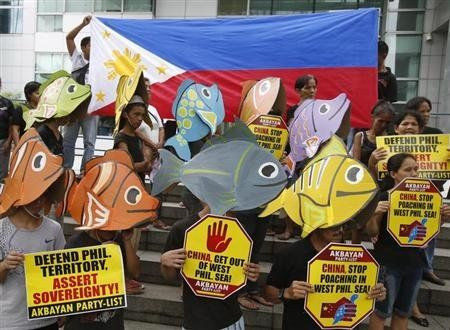Protests In The Philippines Over China's Claims On Scarborough Shoal Shut Down Chinese Visa Office

China is continuing to stake its claim on various areas off its mainland, upsetting several of its neighboring Asian countries, including Japan, Malaysia and Vietnam. Now, protests in the Philippines against China’s claims over disputed maritime territory and the Scarborough Shoal, known to the Chinese as Huangyan Island, have escalated, prompting China to close its visa offices in Manila over safety concerns.
Hundreds of Filipinos gathered outside the visa offices on the one-year anniversary of Beijing’s declaration of the new Sansha prefecture-level city in the Paracel Islands to oversee its other claims in the South China Sea. Among the protesters was Rafael Alunan, a Filipino businessman who wanted to ensure that the protests were not against the people but rather “against your government’s policy of home invasion in our exclusive economic zone” and intended for the demonstration to be peaceful. Still, Alunan’s words had some bite. “We have a long history of resistance, and you are well advised that Filipinos get angry badly,” he told reporters from the South China Morning Post.
The group of roughly 500 protesters gathered outside singing traditional nationalist songs, holding picket signs with statements like “China, get out of our waters” while yelling about the country’s “gunboat diplomacy” and other similar sentiments, even garnering support from Filipino political figures. In attendance were former congresswoman Risa Hontiveros-Baraquel, former congressman and chair to the House defense committee Rolio Golez, and Senator Rene Saguisag.
Also showing their support were a small group of Vietnamese, who chose to join the rally because state restrictions on assemblies of people in their home nation are much tougher. “We Vietnamese like to stand beside you in this struggle against an aggressive China,” Ngo Van Kha, 24, from Hanoi, said. Besides China, Vietnam and the Philippines, three other governments are claiming territory in the South China Sea: Brunei, Malaysia and Taiwan. Though the islands seem to be clusters of barely inhabited land, the gas reserves and potential mineral deposits, as well as maritime shipping lanes, are valuable to all parties involved.
As China continues to be at the center of the disputes, Southeast Asian countries are finding alliances with each other. When Japan’s Prime Minister Shinzo Abe visits Manila this weekend, maritime security and political cooperation in regards to the countries' respective disputes with China will likely be on the agenda. Japan is engaged in an ongoing tug-of-war over the Diaoyu/Senkaku Islands located in the East China Sea. In perhaps the most volatile situation regarding China and disputed territories, both nations have started flexing their military muscle around the disputed territory via ships and aircraft.
© Copyright IBTimes 2025. All rights reserved.






















